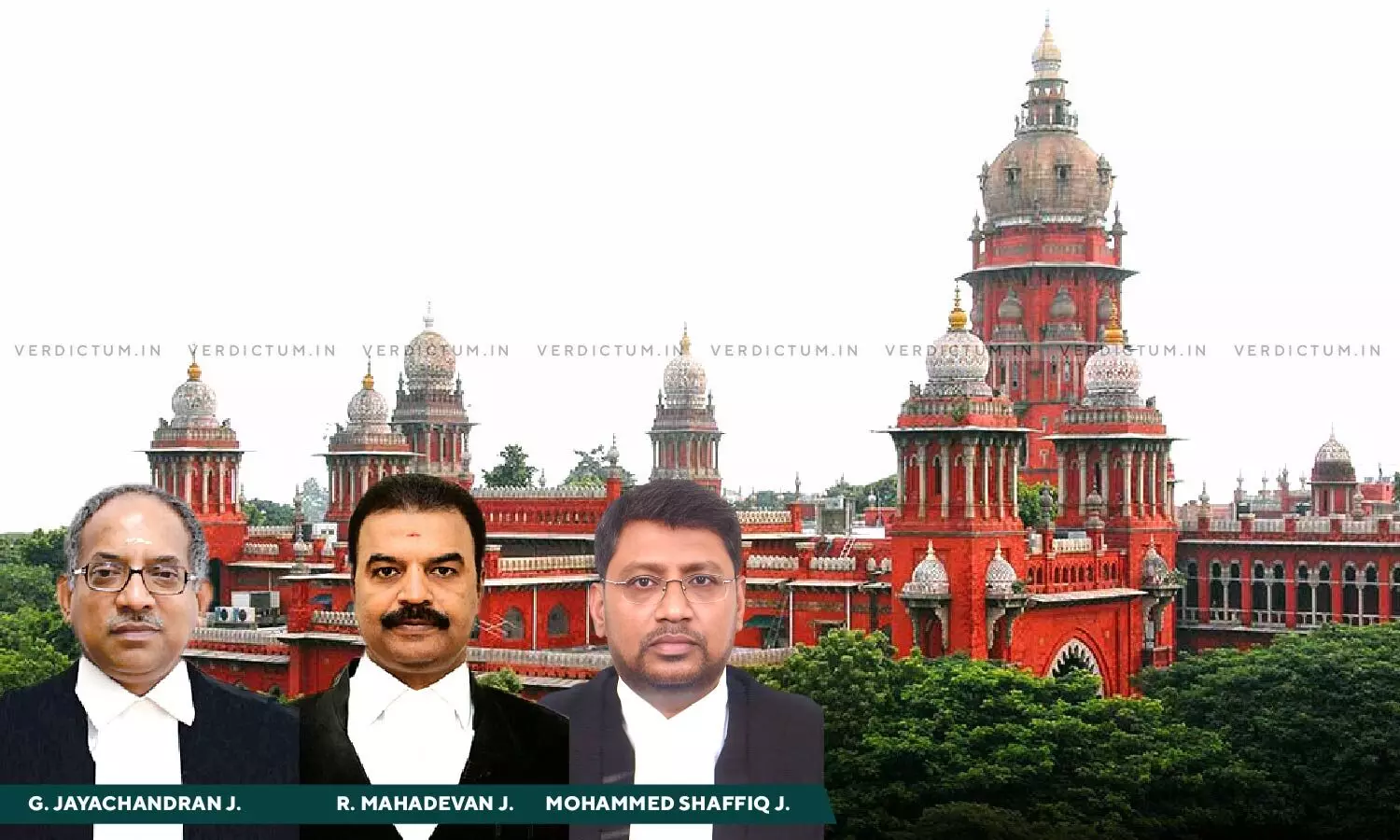
Exhumed Body Must Be Buried In Designated Place Taking Into Consideration The Public Health Under Rules 1999: Madras HC Full Bench
 |
|The Full Bench of the Madras High Court has held that an exhumed body must be buried in a designated place taking into consideration the public health as per the Tamil Nadu Village Panchayat (Provision of Burial and Burning Grounds) Rules, 1999.
The Bench comprising Justice R. Mahadevan, Justice G. Jayachandran, and Justice Mohammed Shaffiq said, “Any body buried in contravention to the Rules 5 and 7, is to be exhumed and buried in the designated place. If such violation is brought to the notice within the reasonable time and despite notice to exhume the body for to be buried in the designated place not adhered by the person concerned, the body is to be exhumed by the authority and collect the costs from the person who is cause for that illegal burial. The exhumed body must be buried in the designated place, taking into consideration the public health.”
The Bench further added that the person who defies the law and refuses to exhume the body, cannot take umbrage in the delay of enforcing the law and make the Court 'fait accompli'.
Advocates N.G.R. Prasad and L. Dhamodharan represented the appellants while Senior Advocate T. Mohan, State Govt. Pleader P. Muthu Kumar, and Advocate K. Elango represented the respondents.
In this case, a resident of Tiruvallur District died in Chennai, and on the next day, he was buried in his village which was in a portion of the land comprised in S.F.No.201/3. The said land was classified as 'Dry Land' as per the revenue records. It stood in the name of a person who died 10 years ago and his wife and two sons were residing in Chittor, Andhra Pradesh.
A plea was filed by one person who claimed to be the neighbouring land owner, seeking issuance of a writ of mandamus directing the District Collector, Thiruvallur, and other officials to take action against the wife and children of the aforesaid man for burying the dead body in the place other than the place designated for burying and burning dead persons. He also prayed for an order to exhume the body and bury the same in the designated burial ground situated at S.No. 205, Vijayamambapuram, Nochili Village, Pallipet Taluk, Thiruvallur District.
The High Court in view of the facts and circumstances of the case observed, “When we look at Rule 7(1) of Tamil Nadu Village Panchayat (Provision of Burial and Burning Grounds) Rules 1999, we find that it is analogous to the Kerala Rules 5(i) which was interpreted the way it should be. … Both Rules 5 and 7 of the Tamil Nadu Village Panchayat (Provision of Burial and Burning Grounds) Rules 1999 start with a negative clause. Rule 5 prohibits new place for burying or burning the dead without license obtained from village Panchayat. Rule 7 prohibits burning or burying any corpse, in any place, within 90 meters of the dwelling place or source of drinking water supply.”
The order of reference before the Court was, “Whether, under the Rules of 1999, the burial can take place at a place other than the designated land, more particularly when the designated land exists in the village?”
The Court further observed that the place licensed as burial and burning ground is exempted from the 90 meters restriction and that Rule 5(1) does not indicate that the place where a body is buried or burnt, will not carry the character of burial ground or burning ground.
“If, single body is burnt or buried and the land owner has no intention to allow burial of body in future. Whoever prefers a new place whether private or public to be used for burying or burning the dead, license from the Panchayat is a pre-requisite. Thus, it is very clear that except the place which has already been registered under Rule 4 or a new place where license is obtained following the procedures contemplated under Rules 5(2) (3) and (4), no body can be buried or burnt in the place which is neither been registered or granted license”, noted the Court.
The Court concluded that the condition of 90 meters restriction found in Rule 7(1) cannot be construed as the right to bury a body anywhere and everywhere and that the burial or burning body is subject to the other provisions in the Rules.
“The conditions of distance restriction from the water body, cannot be read in isolation unmindful of the purpose of the Rules and other provisions thereunder. … any burial in the place other than the place already registered or licensed as burial ground, goes in contravention to Rule 7(1)”, also noted the Court.
Accordingly, the High Court answered the order of reference in negative.
Cause Title- Jagadheeswari & Ors. v. B. Babu Naidu & Ors.